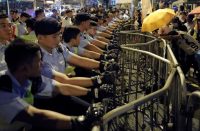
Is a Sub-Cultural Revolution Threatening Hong Kong?
Fifty years ago this weekend broke out what arguably remains the most violent and most traumatic incident in the city’s history since World War II. On May 6, 1967, a labor dispute at a factory producing plastic flowers in the district of Kowloon triggered an eight-month crisis that killed 51 people and injured 832, and momentarily brought the Cultural Revolution to Hong Kong.
Both internal and external factors contributed to the crisis. The policies of the British colonial government had heightened disparities between the bourgeois and the working class, and the poor faced even greater poverty after an influx of refugees fleeing communist China.… Seguir leyendo »













